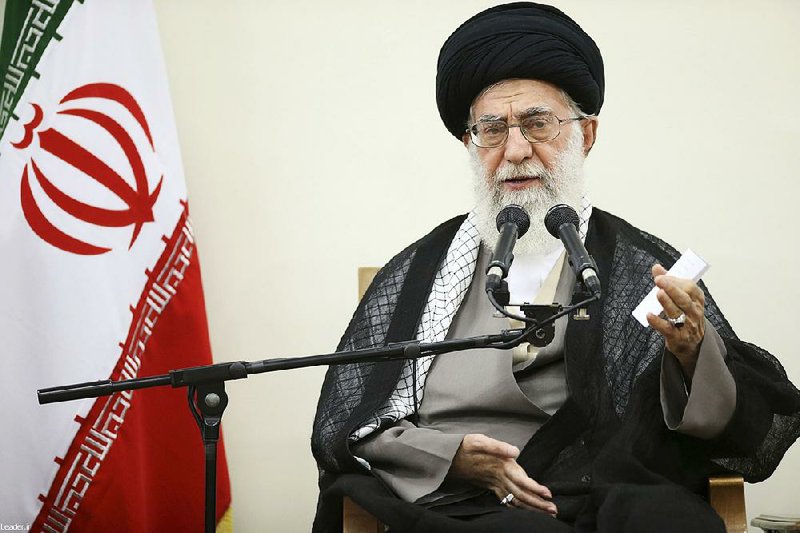JERUSALEM -- Israeli Prime Minister Benjamin Netanyahu will keep campaigning against the Iran nuclear accord even though President Barack Obama has enlisted congressional support in the U.S. to ensure its passage, Israeli officials said.
Obama gained enough Senate votes needed to protect the agreement after Maryland Democrat Barbara Mikulski said Wednesday that she will support the accord. A day later, Democratic Sens. Cory Booker of New Jersey, Mark Warner of Virginia and Heidi Heitkamp of North Dakota joined in support, making 37 senators who publicly back the agreement.
Netanyahu's government, along with Washington allies such as the American Israel Public Affairs Committee, has lobbied against the agreement, arguing it doesn't do enough to prevent the possibility of Iran developing nuclear weapons.
The prime minister said he believes he has the responsibility to continue speaking out against a deal that endangers Israel, the region and the world, a senior Israeli official said, speaking on condition of anonymity because he wasn't authorized to speak on record.
U.S. officials, including Ambassador to Israel Dan Shapiro, have called on Netanyahu to accept the agreement and start preparing for the "day after" its passage. The Israeli leader has delayed important discussions on deepening security cooperation in the deal's wake, Shapiro said last month.
The head of Israel's political opposition, Zionist Union leader Isaac Herzog, criticized Netanyahu for carrying on a lost battle against an accord that he agrees is deeply flawed.
"The minute this agreement became an established fact, Netanyahu should have stopped wasting time and instead conducted an intensive dialogue with the U.S. to create a strong, regional security arrangement to contend with this development," Herzog told Israel Radio on Thursday.
In Washington, the announcement from Booker supporting the agreement was closely watched; he has been under immense pressure from segments of the Jewish community in New Jersey to oppose the deal, and New Jersey's other senator, Democrat Bob Menendez, is an outspoken opponent.
In a statement, Booker said: "It is better to support a deeply flawed deal, for the alternative is worse. Thus, I will vote in support of the deal. But the United States must recognize that to make this deal work, we must be more vigilant than ever in fighting Iranian aggression."
Warner and Heitkamp joined in not long after. Warner called the accord negotiated with Iran by the U.S., Germany, France, the United Kingdom, Russia and China "the best option for advancing the goal of keeping Iran from obtaining a nuclear weapon." Heitkamp declared: "If we reject this deal, Iran will be closer to developing a nuclear weapon, and we will reduce our standing and authority in the world."
Senate Democrats are four votes short of the 41 needed to keep the Republicans' resolution of disapproval from leaving Congress and save Obama from having to issue a veto.
Meanwhile, Iran's supreme leader issued remarks, read aloud on state TV by an anchorman, that "there will be no deal" if world powers insist on suspending rather than lifting sanctions as part of a landmark nuclear agreement, but said it is up to Iran's parliament, and not him, to approve or reject it.
Ayatollah Ali Khamenei has yet to express a clear opinion on the agreement reached in July, which would curb Iran's nuclear activities in exchange for relief from crippling sanctions.
Khamenei said some U.S. officials have spoken of the "suspension" of sanctions, which he said is unacceptable.
"If the sanctions are going to be suspended, then we will also fulfill our obligations on the ground at the level of suspension and not in a fundamental way," he said.
In response, White House spokesman Josh Earnest reiterated the Obama administration's stance that it would focus on Tehran's actions and not its words.
Washington has been "crystal clear about the fact that Iran will have to take a variety of serious steps to significantly roll back their nuclear program before any sanction relief is offered," he said.
Iran's supreme leader traditionally has had the final say on all important matters; on Thursday, Khamenei said lawmakers should decide on the deal.
"It is the representatives of the people who should decide. I have no advice regarding the method of review, approval or rejection," he said.
President Hassan Rouhani is opposed to letting parliament vote on the deal, having said that if parliament votes on the deal its provisions would be legally binding.
But Ali Larijani, the parliament's speaker, said that according to the Iranian Constitution, the agreement needs to be discussed and approved by the Iranian parliament.
He said that's why a 15-member parliamentary committee is examining the deal, including its legality and the supervision and surveillance Iran will be under.
It will report to parliament in a few weeks on its assessment, he said, and "parliament will have to make its decision in about a month."
Larijani, formerly Iran's top nuclear negotiator, said Thursday that he expects a heated debate among Iranian lawmakers -- one even more dramatic than the one in the U.S. -- before they vote on the agreement.
Larijani told a briefing for invited reporters that he personally believes "this deal is a positive thing -- a good thing," but he wouldn't predict the result when parliament votes.
He said Iranian parliamentarians have found "serious and major faults" with the agreement including a mechanism for U.N. sanctions to "snap back" in place if any one of the six negotiating countries determines Iran is failing to meet its obligations.
"For us, this is not possible," Larijani said. "We cannot go back to the situation that we were in before the implementation of the agreement."
Information for this article was contributed by Calev Ben-David of Bloomberg News and by Nasser Karimi, Nancy Benac, Edith M. Lederer, Erica Werner and Ken Thomas of The Associated Press.
A Section on 09/04/2015
